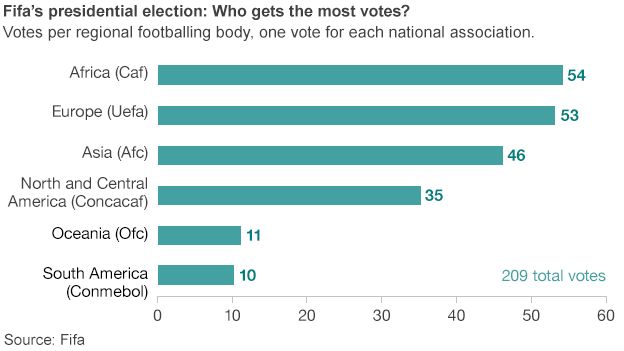The voting has started.
World football's governing body is holding presidential elections in Zurich, as it carries on with "business as usual" despite the upheavals of recent days.
So what will happen, what can we expect - and what surprises may emerge?
Who is standing?
This is one element, at least, that seems predictable - unless one of the candidates withdraws at the last minute, as they did four years ago.
Sepp Blatter, 79, is seeking a fifth term as Fifa president. He has vowed to remain as a candidate, despite the arrest of seven Fifa officials on charges that they received more than $150m (£100m) in bribes.
He is being challenged by the Jordanian, Prince Ali bin al-Hussein, 39. He has been the head of his country's football association since 1999 and is founder of the West Asian Football Federation.
What do they stand for?
According to Mr Blatter's profile on the Fifa website, "his key messages and aspirations are credibility, transparency and fair play". His philosophy, it says, is: "Football for all, all for football."
Prince Ali says he would aim "to shift the focus away from administrative controversy and back to sport", to make Fifa more transparent and distribute earnings more equally.
How does the vote work?
It will be a secret ballot, and all Fifa's 209 member states have a vote each. Members vote in alphabetical order, and it will take some time.
In the first round, if either of the candidates wins two-thirds of the vote - a total of 140 votes if everyone takes part - then he wins.
If there is no outright winner at the end of the first round, a candidate would need to win only a straight majority in a second round of voting.

Who can vote?
Not all Fifa members are countries, and all have an equal vote - so Montserrat, a British territory in the Caribbean with 4,900 residents, has the same voice as India, that has a population of more than 1.2bn people.
How are they likely to vote?
This is where things get a little unclear.
Although the ballot is secret, many of the world's six football associations, in which member states are grouped, have already said which way they will vote.
Michel Platini, the president of the European federation, Uefa, said on Thursday that "a large majority" of Europe's 53 football associations would vote for Prince Ali.
The Confederation of African Football (CAF), with 54 members, and the Asian Football Confederation (AFC), with 46, said they still backed Mr Blatter. But Australia, an AFC member, said it would vote for Prince Ali.
Mr Blatter has also traditionally enjoyed support from the North American federation, Concacaf, whose president, Jeffrey Webb, was among those arrested on Thursday.
It is not known how members in South America and Oceania plan to vote.
Can members abstain?
Yes - and six states did so during the last presidential election in 2011. One of them, the English Football Association, did so after Mr Blatter's only rival, Mohammed bin Hammam, pulled out days before the election after being suspended over bribery allegations.
Mr Blatter was re-elected after receiving 186 of the 203 votes cast.
The president of Fifa presides over its executive committee - where the organisation's real power lies. He or she supervises the committee's eight vice presidents and 15 ordinary members, and casts a deciding vote when necessary.
According to Fifa's statutes, the president also "legally represents" the organisation, "maintains relations between Fifa and the confederations, members, political bodies and international organisations", and "implements the decisions passed by the Congress and the Executive Committee".
And how much do they earn?
Perhaps unsurprisingly, given the recent revelations, the Fifa presidential salary is shrouded in secrecy and estimates vary wildly.
According to Fifa's 2014 financial report it paid a total salaries bill of $88.6m, of which $39.7 million, excluding pension contributions, was paid to "key management personnel" - the executive committee, finance committee and general Fifa management.
That $39.7 million is not broken down any further however. Mr Blatter said in 2011 that his salary was "$1m perhaps a bit more", before adding: "I'm not ashamed by that".
What we do know is that total salaries paid to Fifa key management personnel increased by 95% between 2010 and 2014.
-
Latest Stories
-
Teddy Osei of Osibisa fame dead
22 minutes -
Alexander Djiku hails Fenerbahce’s effort in hard-fought win over Konyaspor
54 minutes -
U-20 World Cup 2009: Black Satellites players reject payment on matured investment
59 minutes -
We reaffirm our unwavering support for government’s efforts to ensure stable, affordable electricity – IPGG
1 hour -
Baseball: Ghana’s Golden Palms retain African Youth Championship title
1 hour -
ORAL is set up to settle political goals, revoke it – Ansah-Asare
1 hour -
Hamas has accepted a draft agreement for a Gaza ceasefire and the release of hostages, officials say
1 hour -
Joy Prime’s Changes Wedding Gown giveaway: Rose Abaya rocks gifted gown from Peace Bridals
1 hour -
This economy has to deliver jobs for Ghanaians – Dr Theo Acheampong
1 hour -
I went to Shatta Wale for advice during my campaign – A Plus
1 hour -
Mahama embarks on peace mission to Bawku and Nalerigu
2 hours -
Karela United closes in on Nurudeen Amadu as new head coach
2 hours -
Kotoko’s Amoah ruled out for 2 months with ankle injury
2 hours -
Akufo-Addo’s government showed no interest in investigating election-related deaths – Peter Toobu
2 hours -
ORAL is corruption CCTV – Ablakwa
2 hours

